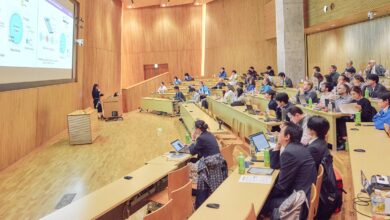EdUHK’s Holistic Health Programmes Contribute to Family Harmony

As physical activity (PA) has significant benefits for health and fitness, the WHO recommends that children and adults engage at least 60 minutes and 150 minutes of moderate-intensity PA per week, respectively. However, owing to global urbanisation, technological advances, and increasing convenience in daily activities, inadequate PA in all aspects of life has become a major public health concern. In Hong Kong, 71% of adults do not meet the WHO PA recommendations. This persistent and growing health-related problem indicates an urgent need to develop an intervention programme that can effectively promote PA at the individual, family, community, and city-wide levels. Therefore, a set of community-based family ‘holistic health’ intervention programmes were developed, implemented, and evaluated in the previous Happy Family Kitchen Movement (HFKM) project to promote well-being and health in Hong Kong.
Dr Henry Ho Chun-yip, Assistant Professor at the Department of Psychology, The Education University of Hong Kong, conducted a study to integrate positive psychology concepts with PA and healthy eating in the programmes. The results of the study provided support for overall intervention effectiveness on well-being outcomes, including family harmony, subjective happiness, and mental quality of life. This article reports findings on the physical health outcomes of the positive physical activity (PPA) intervention from the HFKM to examine its effectiveness for promoting PA and fitness among families.
In the study, a PPA intervention was developed to promote physical activity and fitness among Hong Kong families. PPA utilises positive affective attitudes to circumvent barriers to health behaviour change by helping families associate feelings of enjoyment with physical activity. Zero-Time Exercise (ZTEx) was introduced and promoted as a foot-in-the-door approach.
Using a community-based collaborative approach, the research team worked with social service organisations, a government department, and schools to implement a cluster randomised controlled crossover trial at a citywide scale. A total of 1,983 eligible participants from 1,467 families were recruited from all 18 districts in Hong Kong. Data were collected using structured questionnaires and physical fitness assessments at pre-intervention and one- and three-month follow-up.
PPA was effective in increasing individual ZTEx and ZTEx with family members at one-and three-month follow-up and in improving balance and endurance at three-month follow-up. Within-group improvements were also observed in PPA for ZTEx, ZTEx with family members, balance, and endurance. The qualitative results provided further support for the intervention effectiveness and added in-depth insight into the participants’ motivational, interpersonal, and affective experiences associated with PA after participating in the programme.
The results shed light on the intervention’s effectiveness for PA and fitness, and demonstrated that the community-based collaborative approach is successful in engaging the relevant stakeholders in an active and fruitful partnership with effective capacity building for programme development.
The study was conducted together with Professor Lam Tai-hing at the School of Public Health, The University of Hong Kong.
To learn more about the study, please click here.




